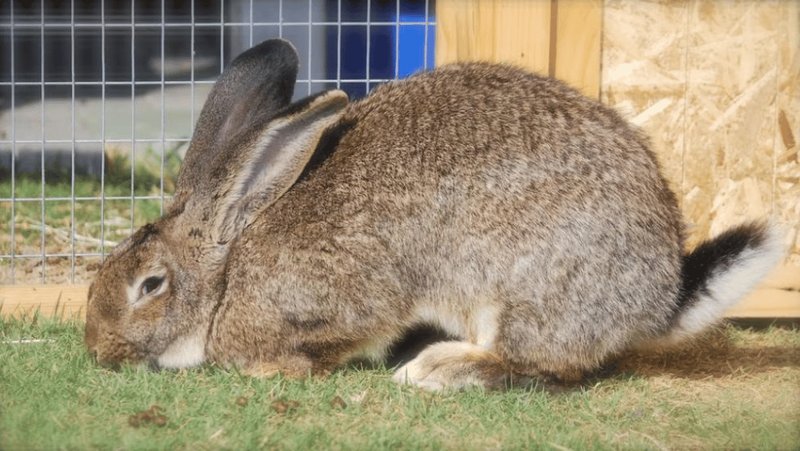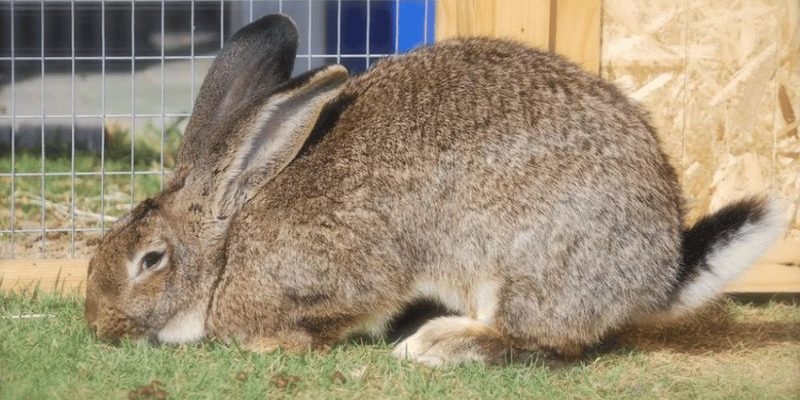
Flemish Giants are known for their impressive size and sweet temperament. However, they face some health problems that can be concerning for any responsible pet owner. From dental issues to digestive troubles, understanding these common ailments is vital. Let’s dive into some of the typical health problems you might encounter with your Flemish Giant and explore how to keep them hopping happily for years to come.
Dental Issues: A Serious Concern
One of the biggest health problems in Flemish Giant rabbits is dental disease. Their teeth grow continuously, much like a pencil that never seems to get shorter. If they don’t wear down naturally through chewing hay and other tough foods, they can develop overgrown teeth. This can lead to pain, difficulty eating, and even infections.
You can help prevent dental issues by ensuring your rabbit has continuous access to hay, which is critical for proper tooth wear. Think of hay as the ultimate toothbrush for your rabbit! Supplement this with fresh vegetables and limited pellets to provide a balanced diet. Checking your rabbit’s teeth regularly for any signs of overgrowth or misalignment can catch problems before they escalate.
If you notice your Flemish Giant struggling to eat, drooling, or having bad breath, it could indicate dental problems. In those cases, a visit to the vet for a dental check-up is essential. Regular veterinary care is crucial to keep your rabbit’s dental health in check.
Digestive Problems: A Delicate Balance
Digestive issues are another common health problem for Flemish Giants. You might find this surprising, but rabbits have sensitive digestive systems that can be easily disrupted. Imagine if you had a delicate balance of ingredients in your favorite recipe — change one thing, and it could ruin the whole meal.
Fiber is crucial for your rabbit’s digestive health; it helps keep everything moving smoothly through their system. Providing an unlimited supply of hay is essential, along with fresh greens and a small number of pellets. Be cautious with treats, as too many sugary or starchy foods can cause digestive upsets, leading to conditions like *GI stasis*, where the digestive system slows down significantly.
If your rabbit shows signs like lethargy, reduced appetite, or abnormal droppings, it’s time to consult a vet. Early intervention is key to resolving digestive issues and preventing serious complications.
Obesity: A Growing Concern
Let’s face it: many of us (including our pets) love a little extra snack time, but for Flemish Giants, obesity can lead to serious health issues like heart disease or arthritis. With their big size, it might be easy to overlook weight gain, but keeping your rabbit at a healthy weight is vital.
The most effective way to combat obesity is through proper diet and regular exercise. Ensure they have enough space to hop around and play—think of it as their mini gym. Set a feeding schedule that includes measured amounts of pellets and fresh greens.
You can tell if your rabbit is overweight if you can’t easily feel their ribs or if they have difficulty grooming themselves. Keeping an eye on their weight and adjusting their diet and activity level can help prevent obesity-related health issues.
Respiratory Issues: A Hidden Danger
Flemish Giants are also prone to respiratory problems, especially if they’re exposed to dust, poor ventilation, or strong odors. Their sensitive respiratory systems can react negatively to things like mold or smoke. Imagine trying to breathe clean air in a stuffy room—you’d feel uneasy, right?
To keep your rabbit’s living environment healthy, provide adequate ventilation and ensure their enclosure is free from dust and harmful odors. Regularly clean their space and avoid using strongly scented cleaning products.
If your rabbit starts to exhibit signs like sneezing, wheezing, or labored breathing, it’s time to take them to the vet. Early diagnosis can make a significant difference in treatment and recovery.
Vaccine-Preventable Diseases: Protection Matters
Another crucial aspect of your Flemish Giant’s health involves protecting them from vaccine-preventable diseases. Conditions like myxomatosis and rabbit hemorrhagic disease can be deadly. Imagine if a simple shot could keep your furry friend safe—pretty compelling, right?
Consult your veterinarian about recommended vaccinations for your rabbit. Given the prevalence of these diseases, staying up-to-date on vaccinations is a proactive way to ensure your pet remains healthy.
Interestingly, keeping your rabbit isolated from wild rabbits and practicing good hygiene can further reduce the risk of these diseases. Yes, it requires some effort, but knowing your rabbit is protected is worth it!
Skin Conditions: Take Note
Lastly, skin issues can crop up in Flemish Giants, often due to poor hygiene or external parasites like mites. If your rabbit starts scratching excessively or you notice bald patches, it’s time to investigate further. Picture having an itchy sweater; you’d want to scratch too!
Regular grooming is essential for preventing and spotting skin issues early. Make it a habit to check your rabbit for any signs of irritation or unusual fur loss while brushing them. If you notice anything off, a trip to the vet can help pinpoint the problem and get proper treatment.
Preventing parasites involves keeping your rabbit’s living area clean and treating them if necessary. Remember, a happy rabbit is a clean rabbit!
Caring for a Flemish Giant rabbit can be a rewarding experience filled with love and companionship. By understanding these common health problems and how to prevent them, you’re well on your way to ensuring your furry friend leads a long, healthy life. Think of your role as a caretaker, guiding them to stay strong and joyful.
Regular veterinary visits, a balanced diet, and a clean living environment are all part of nurturing your rabbit’s wellbeing. Keep a watchful eye, provide plenty of love, and your Flemish Giant will surely thrive, bringing joy to your life every day.

